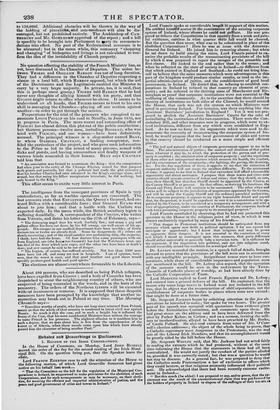No question affecting the stability of the French Ministry has,
as yet, been discussed in the Chamber of Deputies. The union be- tween THIERS and ODILLON BARROT was not of long duration. They had a difference in the Chamber of Deputies respecting a clause in a local bill, which BARROT opposed, but which the aid of the Doctrinaires and the Legitimists enabled the Minister to carry by a very large majority. In private, too, it is said, (but this is perhaps mere gossip,) TRIERS told BARROT that he had sever any thoughts of allying himself with his party, and that Gomm' might return to office whenever he chose. It seems to be understood on all hands, that THIERS means to trust to his own skill in managing the Chamber—playing off one section against another—in order to get through the session. Preparations for the trial of the prisoners who conspired to as- sassinate LOUIS PHILIP on his road to Neuilly, in June 1835, are in progress in Paris. The more recent and astounding affair of FIESCHI has almost driven this plot out of the public recollection ; but thirteen persons—twelve men, including B0IREAU, who was tried with FIRSCHI, and one woman— have been definitively accused. The principal witness is a clog-maker named BRAY, to whom GABRIEL CHAVEAU, a leading conspirator, con- fided the particulars of the project, and who gave such information to the Police as led to the arrest of many persons, armed with dirks and pistols, and having ammunition and deadly weapons of various kinds concealed in their houses. BRAY says CHAVEAU told him that " An association was formed to assassinate the King ; that the conspirators had often gone-to the entry of the Champs Elysi.es, armed fur that purpose with pistols and poniards, but that a poltroon had made the plot miscarry ; that his brother Charles had once advanced to the King's carriage alone, well armed, but that seeing his fellow conspirators irresolute, he did nothing, but only bowed to the King."
This affair seems to excite very little interest in Paris.


























 Previous page
Previous page